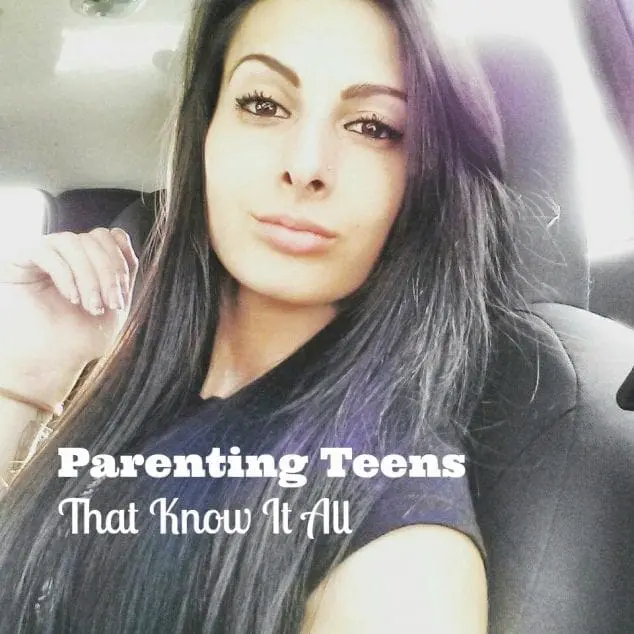Teenagers are strange and fascinating creatures. One moment they’re all sweetness and light and the next they turn into hormone-fueled beasts that can test the patience of even the most stoic of parents. No one ever said the teenage years would be easy, but while every teen and every family are unique, no one ever said it would be this hard either. When parenting teenagers in high school, help may sometimes be needed whether it is the practical advice of a friend or a professional. Explore practical and effective methods to break through the communication barriers with your teenager, creating a foundation of trust and understanding for a closer relationship. Here are a few things to keep in mind on how to parent a teenager.
How To Parent A Teenager
Science has a few solid explanations for the otherwise unexplainable behavior of the modern teen. The decision-making portions of their brains are not yet fully developed and add hormones to this mix and you have a child who is trying to act like an adult but truly lacks the capability to do so.
We can expect certain respectful behavior from our teens to help maintain harmony in the family, but without clear direction and firm rules teens are more likely than not to lose sight of their goals and find themselves in situations they’re not prepared for.
If you’re the parent of a teen and feel like you’re at the end of your rope, some of these tips for how to parent a teenager could help save your sanity. It is possible to help your teen adjust their behavior and restore your healthy relationship as a loving parent and child.
Show And Tell
It’s a dangerous mistake to only communicate to teens in one way. Especially when it comes to important stuff like “I love you” or “I’m there for you.” If you’re just showing or just telling, teens may never receive your message. You may think you’re communicating how much you love them all day long, but they’re not getting it – it doesn’t make sense. The fact is, the teen you’re trying to reach may not receive or process information the way you are trying to communicate it. Some parents/teachers/mentors/coaches just try to show teens they love them, but don’t tell them. Other people just tell teens they love them, but never show them. You must do both. Nothing encourages your teen more than knowing (and hearing) you love them and are there for them.
Be Real
Get off your high horse, step down from your soapbox, and put away your know-it-all lecture notes. Embrace the fact that you’re imperfect, that you have a past full of mistakes and lessons learned the hard way. Sometimes the things in life that hurt you the most, are the very things you can use to help others. Don’t miss out on the opportunity to build a bridge. Repeating the standards they’ve failed to meet isn’t encouraging to teens. And hearing you talk like you’re perfect when they’re struggling isn’t helpful either. In fact, it is just plain annoying.
Learn from your own failings to help them pick up and move on. Consider a time when you were struggling. Who did you turn to? Your friend who acts perfect and makes you feel inferior? Or your friend who acts human and who gets what you’re going through and opens up a bit about their own struggles? Be human. Be the perfectly imperfect adult – your teen will relate to you much, much better!
Listen to Your Teen
Teens have a lot to say but many feel as if no one hears them. And while it’s true that getting your teen to open up about their feelings can be like pulling teeth, deep down inside your teen wants your acknowledgment and wants you to hear them.
Many parents find that pushing the issue only causes the teen to shut down. Try to have a neutral conversation in a neutral environment, such as a car ride. Don’t ask pointed questions and don’t accuse. Keep the conversation light and let them set the tone. Then you can use phrases such as “how did that make you feel?” and “what do you think could have been different about the situation?” These types of questions don’t place blame and may help your child tell you what’s bothering them and how you can help.
Engaging on an everyday or at least consistent basis will help your teen know you care and that you want to hear what they have to say. Alienation happens when you stop trying.

Set Clear Expectations
Setting clear expectations is going to make things better for you and for them! They aren’t mind readers. It doesn’t feel good to your teen to let you down and not even see it coming. It doesn’t feel good for you to be let down. The first step is hold a family meeting and have an open conversation about what you consider to be fair expectations. Give them a chance to respond and get their buy in.
Consequences
Throughout anyone’s life there will be expectations and natural consequences. This includes both parents and teens. Dad’s boss expects him to be on time for work and there are consequences if he doesn’t do that. The same is true for your teen. If you expect your teen to perform a certain household task and they fail to do so, there must be consequences.
Consequences and follow through are two important lessons that teens need to learn on a regular basis starting with the small things so that the big things don’t come as a shock.
Follow Through
Following through with a punishment is never easy, whether you’re a manager or a parent — and you may feel like both — but failure to follow through gives your teen the impression that you don’t mean what you say. Not only does this lead to the belief that they can misbehave and avoid consequences but it also shows them they can’t trust you to do what you say you will. If they can’t expect that from you how can you expect it from them?
Be An Authority Figure, Not Just A Friend
This one ties into the consequences and follow through we were just talking about. Teenagers need a parent. They need a role model– an authority figure. Can you be both? Sometimes, ideally, yes. You can and should balance your authority with love and friendship. Relating is great. Being fun to be around is great. However, you are not supposed to be a teen’s buddy or BFF. It may feel nice, it may be easier, but in the long run, your relationship with them is much stronger if you are the authority figure they need – not what feels the most warm and fuzzy for you.
If you really care about them, you’ll give teens what they need and not just what they want – or what you want. As an authority figure, a parent, a teacher, or role model, you’re supposed hold teenagers accountable. It’s your responsibility to establish and enforce the rules and consequences, to draw healthy boundaries. It’s up to you to maintain a stable, loving environment where teens feel secure.
Many parents and authority figures are scared of being labeled as the “bad guy.” But here’s a secret – teens will tell you all day long they don’t want boundaries but, down deep, boundaries make teens feel safe. Remember your own parents, drawing and keeping boundaries, teaching teens the difference between right and wrong, what’s acceptable and unacceptable. This is your responsibility as the parent, no one else’s.

If Parenting Teenagers Has You Feeling Overwhelmed, Remember There Is Help
In even the best homes, where parents feel they’ve done everything right, raising a teenager sometimes gets confusing and hard. You may feel like you don’t have the answers.You may need help reaching your teen.There is a good chance you need to open the door for better communication and information flow. Don’t give up, keep trying.
It is like Dr. Michael J. Bradley, PH.D says in his book, CRAZY-STRESSED: Saving Today’s Overwhelmed Teens with Love, Laughter, and the Science of Resilience (affiliate link). “Think of parent involvement as a 10-point scale. One grief-based parenting response—seen more often in dads than moms—is withdrawal, which is 1 on the 10-point scale. (“The hell with him. He’s on his own. Who cares what he does?”) Cutting off your kid can feel satisfying in a macho, payback sort of way for a little while, but it’s dangerous. There is a huge risk in withdrawing parenting from a brain-challenged creature in the midst of the most transformative changes of his life, and in the midst of a toxic culture that will rush to fill that vacuum with scary prompts.”
When Professional Help Is Needed
Often this can occur when there is a big problem that needs be addressed and worked through. Such big problems can include divorce, death in the family, death of a friend, phone addiction, alcohol or drug use, eating problems, peer pressure, bullying, and other risky behaviors. In challenging times, you can turn to the school counselor for help in determining what is happening at school and if they have any helpful resources. I also suggest the help of a family counsellor in these cases when possible.
A professional who has extensive experience with teens and behavioral issues can offer you an outside perspective. They can also help when your child needs someone to talk to but isn’t comfortable talking with you. Often times children fear letting their parents down. They don’t want to share their inner fears or anxieties because you may seek their weakness and be disappointed. It may not be entirely rational but they may even fear you will stop loving them. Hearing good sound advice from a professional can be helpful for both the teenager and the parents.

Parenting A Teenager Book
Another helpful option may be a trip to the library to check out a book on parenting teenagers. Sometimes, a different point of view or a clear set of instructions is just what you need. There are lots of options and some may even be aimed at the particular problem you are facing. See this great list of 15 Best Books For Parenting Teens.
Parenting A Teenager Quotes
Maybe you just need a bit of inspiration for your parent-teen relationship. Here are a few quotes on parenting a teenager to help.
“Conscious parenting is not about being perfect, it’s about being aware. Aware of what your kids need from you to reach more of their full potential.”
– Alex Urbina, The Inspirational Parent: The Magical Ingredients For Effective Parenting
“You will teach them to fly, but they will not fly your flight. You will teach them to dream, but they will not dream your dream. You will teach them to live, but they will not live your life. Nevertheless, in every flight, in every life, in every dream, the print of the way you taught them will remain.” – Mother Teresa
This quote is not actually about parenting teenagers but if you teach this message to your teens and remember it yourself, you will be well served. “Success is not final, failure is not fatal: it is the courage to continue that counts.” – Winston Churchill
Conclusion
Sometimes parenting a teen may be hard as you watch them struggle and you don’t know how to help them. Or you see them going down the wrong roads and they don’t want to listen to your words of caution.
At other times parenting will seem so rewarding, as you are lifted up by a sweet unexpected action. Or amazed to see them growing into a thoughtful young person instead of a careless child.
Remaining sane and raising a teen can feel like the mother of all problems but even for those families with seemingly insurmountable problems parenting teenagers, help is available. You just need to be consistent in communicating with your teen, setting boundaries, and knowing when to ask for help. Again, no one said parenting teenagers would be easy, but it is a stage they will grow out of be better for if you consistently keep doing your best and getting help when needed. Is parenting teenagers tougher than you thought it would be? Where do you turn for help?
Related Posts:
Parenting Teen Boys- 10 Things You Should Know
Teen Driver Safety And Ways to Prevent Teenage Driving Accidents


Ask Helen says
I couldn’t agree more. I really learn a lot from you! The more quality time you spend with young adults the better. Parents of teens should also keep them off social media as much as possible. This is worth sharing 🙂
Nanajee says
Parenting a teen really is one of life’s toughest tightrope walks, isn’t it? That heart-sinking feeling when you see them stumbling but they won’t take your hand – it takes all your strength not to just swoop in and fix everything. What’s helped me is remembering that sometimes the best support is simply being present without pressure. (And secretly stocking up on their favorite snacks for when they do finally open up!) Hang in there – your care matters more than they’ll probably ever say.
Unique places in the World says
Ugh, yes. Parenting teens is like watching someone you love navigate a maze blindfolded—you can see all the dead ends ahead, but they need to bump into the walls themselves. What kills me is that fine line between being their safety net and giving them space to grow. Some days I bite my tongue until it hurts! But then there are those rare moments when they actually ask for advice, and suddenly every second of worry feels worth it. Solidarity, fellow parent—we’re growing just as much as they are.
Therapy Company says
Great post! Parenting teens can be challenging, but these techniques are so practical. Setting boundaries while staying empathetic is key. Love the focus on active listening—it really strengthens trust. Thanks for the helpful tips!